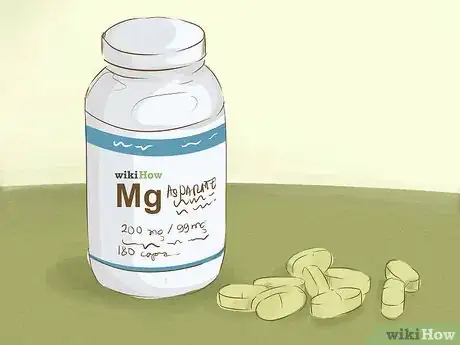This article was medically reviewed by Sarah Gehrke, RN, MS. Sarah Gehrke is a Registered Nurse and Licensed Massage Therapist in Texas. Sarah has over 10 years of experience teaching and practicing phlebotomy and intravenous (IV) therapy using physical, psychological, and emotional support. She received her Massage Therapist License from the Amarillo Massage Therapy Institute in 2008 and a M.S. in Nursing from the University of Phoenix in 2013.
There are 7 references cited in this article, which can be found at the bottom of the page.
This article has been viewed 25,192 times.
Magnesium citrate is an over-the-counter drug made from magnesium salt and citric acid. Because it is quick to absorb and contains one of the human body’s most prevalent minerals, magnesium citrate is often used as a fast-acting laxative or dietary supplement. When taken properly, it may help with, among other things, constipation, indigestion, irregular heartbeats, and migraines.[1]
Steps
Taking Laxatives
-
1Purchase an oral laxative. To help relieve irregularity and constipation, look for magnesium citrate in the form of a saline oral laxative solution. These are available over-the-counter and can be found in most supermarkets and drugstores.
-
2Take the amount recommended on the bottle. Different brands of laxative will have slightly different instructions, so read the back of the bottle carefully before taking any medicine. Pay special attention to how many doses the bottle contains, how often you should take it, and the amount recommended for people your age.[2]
- Read any listed warnings before taking the laxative. If necessary, consult a doctor prior to use.
Advertisement -
3Take each dose with 8 fluid ounces (240 ml) of water. Laxative solutions require a significant amount of liquid to work, meaning they can cause dehydration when used improperly. To avoid this, take your laxative with a full, 8 fluid ounces (240 ml) glass of water. After use, make sure to keep yourself hydrated throughout the day.[3]
-
4Use laxatives sparingly to keep your bowels strong. Laxatives should be used to fix occasional irregularity, not long-term bowel problems. To keep your bowels strong and healthy, do not use laxatives for over 7 days at a time. If your constipation symptoms remain for longer than a week, stop taking magnesium citrate and consult your doctor immediately.[4]
Using Dietary Supplements
-
1Purchase 200-500 mg dietary capsules or tablets. To fix issues not related to constipation, such as magnesium and calcium deficiency, look for magnesium citrate capsules or tablets that have “Dietary Supplement” written on the label and contain between 200 and 500 milligrams per unit. Avoid products that skew far higher or lower than these amounts, as dose recommendations for magnesium citrate tend to be around 400 mg.
-
2Take each dose as instructed on the packaging. Read the back of your supplement case to see how large a dose you should take and how often you should take it. Some brands put an entire dose in one pill, while others split it among two or three.
- Before taking the supplement, look through any warnings listed on the package. Talk to your doctor if necessary.
- If you are pregnant or breastfeeding, avoid taking any dietary supplements unless prescribed by a doctor.[5]
-
3Drink 8 fluid ounces (240 ml) of water with each dose. Your body can absorb magnesium citrate extremely quickly. That’s great for enjoying the benefits of each capsule or tablet, but it can leave you dehydrated if you’re not careful. Make sure to take each dose with an 8 fluid ounces (240 ml) glass of water, and drink more throughout the day as necessary.[6]
-
4Take your dose while eating to avoid stomach aches and diarrhea. Though not marketed as laxatives, magnesium citrate dietary supplements can potentially cause bowel movements, bloating, nausea, stomach pain, and diarrhea. To minimize the chance of this happening, take your dose with food. If possible, take the supplement during a meal.[7]
Warnings
- Unless specifically prescribed together, avoid taking magnesium citrate with Digoxin, Eltrombopag, Elvitegravir, Gefitinib, Ketoconazole, Ledipasvir, Levomethadyl, Licorice, Mefenamic Acid, Mycophenolate Mofetil, Mycophenolic Acid, Pazopanib, Phenytoin, Quinine, Raltegravir, Rilpivirine, or Vismodegib.⧼thumbs_response⧽
- Magnesium citrate is not recommended for people with heart disease or kidney problems.⧼thumbs_response⧽
- If using magnesium citrate causes any unusual allergic or medicinal reactions, stop taking the drug and contact your doctor immediately.⧼thumbs_response⧽
References
- ↑ https://ods.od.nih.gov/pdf/factsheets/Magnesium-Consumer.pdf
- ↑ https://www.drugs.com/mtm/magnesium-citrate.html
- ↑ https://www.mayoclinic.org/drugs-supplements/laxative-oral-route/proper-use/drg-20070683
- ↑ https://www.nationaleatingdisorders.org/learn/general-information/laxative-abuse
- ↑ https://www.mayoclinic.org/drugs-supplements/magnesium-supplement-oral-route-parenteral-route/before-using/drg-20070730
- ↑ https://www.ncbi.nlm.nih.gov/pubmed/2407766
- ↑ https://www.health.harvard.edu/diseases-and-conditions/dont-bomb-the-bowel-with-laxatives
About This Article
Taking magnesium citrate can help with constipation, indigestion, irregular heartbeats, and migraines, among other things. When taking magnesium citrate, always take the dose that's recommended on the packaging. Also, make sure you drink 8 fluid ounces of water with each dose since magnesium citrate can increase your risk of dehydration. You should also take your dose with food to avoid digestive issues. To learn how to use magnesium citrate as a laxative, read on!



































































Medical Disclaimer
The content of this article is not intended to be a substitute for professional medical advice, examination, diagnosis, or treatment. You should always contact your doctor or other qualified healthcare professional before starting, changing, or stopping any kind of health treatment.
Read More...